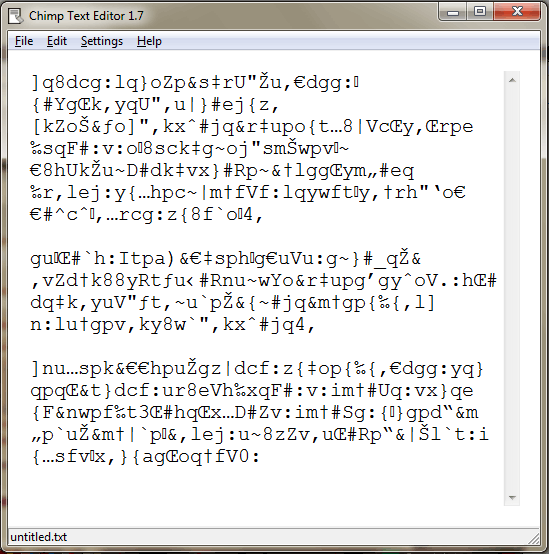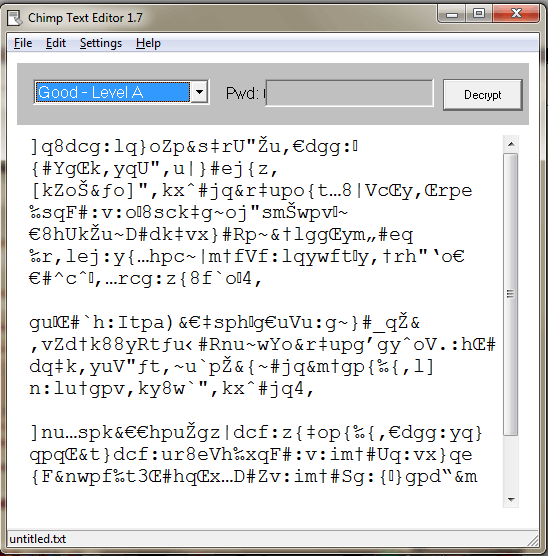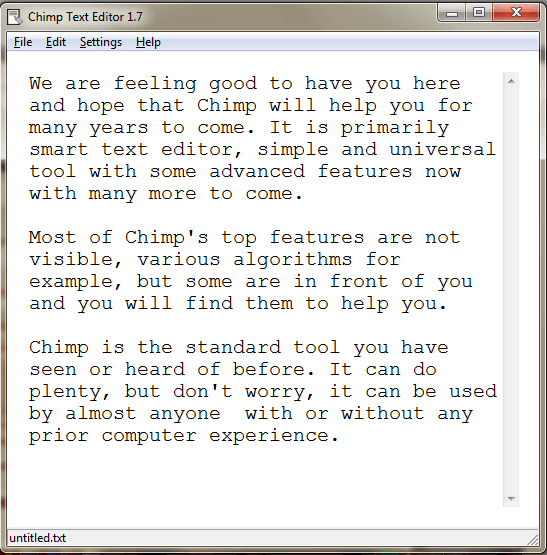
Help and Support to Chimp Text Editor
Intro / Chimp Can Do / Registration / Basic Features / Editing / Search / Advanced Features / Shortcuts / Comfort & Hints / Supporters
ADVANCED FEATURES
Encryption
When you have a text you wish to keep safe and private, Chimp offers encryption function for you. And with three options! Encryption is very safe and correct and our three options change its security level and ease of use.
Brief summary of encryption is as follows. There are 3 options or levels to encrypt the text. Level A is the easiest to apply, you don't need to remember its password, Chimp does it for you. Level B is safer and password needs to be remembered, but it's limited to 3 characters and all of them are digits. Level C is the most secure option, you need to remember the password and it needs to be from 6 to 12 characters long.
Same algorithms and passwords are used for decryption.

This is what Chimp screen looks like with text and befor encryption function ...

This is an example of what it looks like after one quick Level A encryption. It is only a visual sample and so not too safe.
Encryption
Level A - Good
First option is the one that's least secure but easiest to use and practical. One super complex random password is prepared in the Chimp application for this purpose and can always be changed by you the user. Apply it to your text, it will encrypt it and lets you save it. There is nothing complex to remember, you just need to know you used Chimp's Level A to encrypt it ... and that's easy. It is safe and complicated encryption method, but it can be defeated if someone else also uses your Chimp to decrypt it. If they use their Chimp, they could only decrypt it if they have the same password as you. You don't have to remember the password for Level A, Chimp has it stored. Is it secure? Yes, very. Is it easy to use? Absolutely. It does the work, remembers everything, so to handle it is extremely easy for users.
For most purposes it is more than enough and for when you need better encryption strength, the Level B and C might work better.
Level B - Very Good
Second option needs your memory, but not as much. And it is slightly less secure than Level C. Chimp carries about 1,000 private random passwords and it lets you use any one of them to encrypt your text. You will not even see the password, you don't choose it as a random set of letters, but as the number from the list of all passwords. Choose number 473, you have chosen password nr 473 from the list of passwords. Chimp will apply it to your text, show you the encrypted result and you are free to save it. Very simple, safe and you just need to remember the number to choose.
Level C – Secure
Select the third option and it is very secure. It takes part of Level A and another part from Level B, adds a bit on top and works for you. Type in your password, Chimp applies it to text, encrypts it and you are free to save the result. It is very fast and very secure. But the security is only good if you remember the password. Good passwords are usually absolutely random and tough to remember. Easy words as passwords are easy to remember but also easy to guess and break through.
True safety simply costs a bit of effort. Imagine using good password that's easy to remember, but saving your document and opening it in a very long time. Say next year or later. If you forgot the password, it's all gone.
Decryption
When you have or receive text encrypted by Chimp, and you wish and need to read it or simply access it, Chimp's decryption function is there for you. Just like encryption also with three options!
Encryption is very safe and easy to use and our three options improve its security level options and also its ease of use.


And these two pictures above are samples of text to be decrypted and the result. It works well, it looks good and it took less than 1 second.
Level A - Good
Very safe and by far the easiest to use. For normally set up Chimp there is nothing to remember, because the software maintains the required password. And that is used for encryption as well as decryption, so there is nothing to worry about. Warning comes when your computer or access to your encrypted files is not completely private but rather shared with others. If you use Level A, anyone else can use Level A as long as they have the same password as your Chimp. Most installations of Chimp have unique password for Level A, but it cannot be 100% guaranteed. Especially if your computer can be accessed by others.
Password for Level A can be changed or updated and this can make it much more secure as long as you remember which password was used for which document. Most users of Level A keep the same password in Chimp to avoid any potential future problems.
Level B - Very Good
Level B keeps the basic encryption also very safe, but it uses very safe password that user needs to access. Password is longer with more characters, it's random, and Chimp maintains list of 1,000 passwords to choose from. It is better than remembering how to spell out 12 character random password. All user needs to remember is the number of selected password on the list in three digits - from 000 to 999. Every user of Chimp who uses Level B encryption has a choice of 1,000 passwords, but needs to remember only the number of selected password. Choose 333, it's guaranteed to be different from other 999 passwords, and you only need to remember 333.
Level C – Secure
Safest is the Level C and without any complaints. It is incredibly safe algorithm just like Level A and B, but Level C needs your custom and unique password from 6 to 12 characters. To top it off you need to know that the computer does not save or store your password anywhere in the computer, it is not entered anywhere in your encrypted text, it's simply only in your mind. Extremely safe algorithm, but you need to remember the password. If you wish to use Level C, congratulations, result will be safe and private. If you keep the result stored for long period of time, it's important to be able to access it with your real password. If you care about security and privacy and have some place where you store private items, this may be where to keep your passwords written down on a piece of paper. Plus you could try to come up with password that is unique, but reminds you of something. First 3 letters of 4 of your family members' names will give you perfect 12 digit password, for example Jack, Anna, Paul and Mary and you have JacAnnPauMar. Looks pretty good, but you can come up with something even better.
Always also remember that passwords in Chimp can use small letters, caps and numbers and that can give you more randomness. martiN98jiM99 could be good if two of your kids are named Martin and Jim and were born in 1998 and 1999.
Password Got Lost?
It can make for a very bad day. Password gets lost, but so does access to many of your documents, articles, letters. And it does not look like just an average loss, but it feels like a loss forever.
Sometimes you may have a way to come to a solution, sometimes there may be none. We did not build any secret backup way to what Chimp encrypts, what you see is what you have.
Level A
Level A keeps your password safely stored. If such password gets lost, it is likely part of some bigger issue, for example computer error or software crash. If you had not saved your password elsewhere or did not have second installation of Chimp on another computer, simple access to your data has been lost. And the alternative task is now to recover your password.
Level A password is typically 8 characters long, small letters, capital letters and numbers. In theory it is possible to recover your password and access, but it would require massive amount of math and computer work. Each character has 62 options and so 8 character password can have up to 218,340,105,584,896 options. That's 218 trillion possible passwords, if your password was absolutely random. If it was standard English word available in dictionary, there are about 50,000 estimated available 8-letter words. Whatever the accurate number is, it will be very far from 200 trillion. A\In any case, to get your correct answer to find the lost password, one needs to try trillions of combinations and detect which one is correct.
If your computer and software can check 1,000 combinations per second, the calculation of which one option is the correct password would take about 2.5 million days. 100,000 per second and it would take 25,270 days. Million per second (we can dream) and the result would show up in 2,527 days.
Level B
Level B is different and more secure than A. It needs you to use your own password, but to make it easier for you, each such password has only three numbers. For example 234 or 745. Chimp translates each 3 digit number into one very secure and random password of 12 letters and proceeds with encryption. And decryption as well.
Password with 12 letter words with randomly selected characters has 3,226,266,762,397,900,000,000 possibilities. That is 3 sextillions. Can you recover it when it gets lost through the common math functions on standard computer? Probably not. Say it was not random password, but a couple of real words together, 4 letters and 8 letters, all small letters and no numbers. Could you? We have an estimate of 150,000 4-letter words and 50,000 8-letter words and to consider all combinations of those we would arrive to 7,500,000,000 or 7.5 billion passwords. Theoretically doable, but practically it's better to remember your password.
Results are very hard and almost far too safe, but the truth is slightly little less bad. Level B uses your password which has 3 digits and converts it into 12 letter random passwords. What that means is Level B has 12 letter passwords, but only 1,000 of them – that's what we get from user's password 000 to 999. So the lost password in Level B is difficult, but possible.
Level C
Level C is easy to explain, but it is the most secure encryption that comes with Chimp. Computer saves nothing, it has no secret storage or memory, password it uses has to be entered by user and it is not saved anywhere. Password can have letters and numbers, so each character has 62 options (26+26+10). And the password can be 6 to 12 characters long for extra variability. If your password got lost, nothing in the computer or in Chimp would help you to recover it. The only theoretical possibility is to test all 6 to 12 character possibilities until one of them works for you. How many such possibilities are there? Between 56,800,235,584 for 6 characters until 3,226,266,762,397,900,000,000 for 12 characters. And of course your system would have to go through all of them, because we don't know the size of the password.
In any case Chimp is very safe tool and so do yourself a favor and use it, but don't lose your password. And have some backup solution just in case it happens and password gets lost. Chimp has very secure encryption (and decryption) system, which is meant to protect the text and talking about losing one's password is a good proof to know how good it is.
You need protection or privacy, Chimp will help you.
Intro / Chimp Can Do / Registration / Basic Features / Editing / Search / Advanced Features / Shortcuts / Comfort & Hints / Supporters